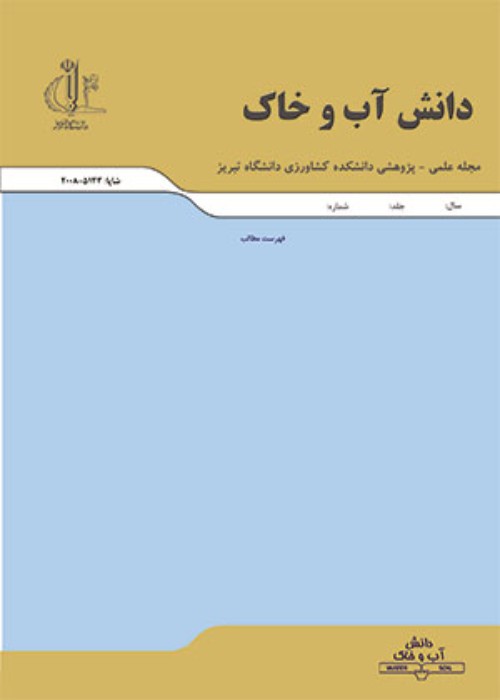Short-Term Effects of Organic Manure, Sulfur, and Sulfo-Barvar-1 Biofertilizer on Some Biological Properties of a Calcareous Soil
Most of the soils in Iran are affected by over-accumulation of calcium carbonate (CaCO3). It is estimated that more than 87 percent of the agricultural soils have more than 5% equivalent calcium carbonate. In these soils, the addition of elemental sulfur is known to be desirable for the elimination of nutritional disorders which has been caused by high pH. Sulfur could reduce soil pH and increase the bioavailability of elements like Fe, P and, etc. Such management also may change the environmental conditions around microbes in the soil and alter their activities in soil media. Soil quality is strongly depending on soil pH so, it will be affected by sulfur application in the soil. However, the impact of this management on soil biological activities has not received adequate attention. Therefore, the aim of this study was to investigate the effect of sulfur as well as its integrated application with animal manure and Sulfo Baravar-1 containing sulfur oxidizing bacteria on the biological parameters of a calcareous soil.
An unfertile soil sample was picked up from non-cultivated condition having 16% lime content. A factorial experiment as randomized complete blocks design was conducted with the elemental sulfur application (zero (S0), 1 % (S1), and 2 % (S2)), organic manure from cow waste (application of 1% cow manure and non-application), inoculation of Sulfo Baravar-1 Biofertilizer (inoculation and non-inoculation). The effects of treatments on soil pH and soil biological properties such as soil organic matter (SOM), soil respiration, microbial biomass carbon (MBC), and substrate induced respiration (SIR) were investigated for 60 days after treatments. Soil microbial metabolic quotient (qCO2), soil microbial quotient (qmic) and, the ratio of qCO2/SIR were calculated as well.
The results showed that, addition of sulfur, sulfur plus organic manure and, Sulfo Baravar-1 inoculation decreased soil pH. Most pH reduction was occurred at 2% sulfur application. In response to soil pH variation, soil respiration increased with different patterns between the treatments. Although, the sulfur application could increase soil basal respiration but, the highest value was seen in organic manure plus 2% sulfur treatment. Despite increasing of CO2 emission from the soil due to respiration, the meaningful variation in SOM was not seen in sulfur treatments. Organic manure application increased SOM content by 0.15 %. MBC increased by 52% and 72 % respectively in 1% and 2% sulfur application in respect to control. Organic manure application along with sulfur had a positive effect on MBC, but this trait was not affected by Sulfo Baravar-1 inoculation. The ratio of qCO2/SIR was reduced by sulfur application up to 98% in S1 and 400% in S2 treatments, respectively. The sulfur application with Sulfo Baravar-1 inoculation and without its inoculation decreased qmic by 47% and 80%, respectively. While, sulfur application along with manure shifted this trend vice versa and qmic increased 34% in respect to control (S0). Sulfur application also increased substrate induced respiration at S1 and S2 at a rate of 90% and 94%, respectively, and increased metabolic coefficient (qCO2) in S1 and S2 treatments 2.7 and 370%, respectively in respect to control. qmic and SIR were not affected by organic manure application and Sulfo Baravar-1 inoculation to the soil. Based on the results, there was a linear correlation between soil microbial biomass carbon, soil basal respiration (R2= 0.98) and qCO2 (R2=0.82). Substrate induced respiration had a relatively weaker correlation with soil microbial biomass carbon (R2=0.27).
All the treatments decreased soil pH compared to controls but, more decline of soil pH was observed in 2% sulfur applied treatments especially in organic manure plus sulfur application. SOM quantity and quality are important factors of soil quality as well as its sustainability. Sulfur application plus organic manure had a positive effect on SOM content, and qmic as an index of SOM quality. Therefore, the application of animal manure along with sulfur will increase soil quality as well as improves the soil pH. Due to the destructive effects of the sole application of elemental sulfur on soil biological traits, the application of sulfur is recommended with organic manure for the soils rich in calcium carbonate.
- حق عضویت دریافتی صرف حمایت از نشریات عضو و نگهداری، تکمیل و توسعه مگیران میشود.
- پرداخت حق اشتراک و دانلود مقالات اجازه بازنشر آن در سایر رسانههای چاپی و دیجیتال را به کاربر نمیدهد.


